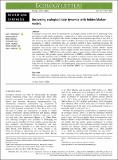Files in this item
Uncovering ecological state dynamics with hidden Markov models
Item metadata
| dc.contributor.author | McClintock, Brett T. | |
| dc.contributor.author | Langrock, Roland | |
| dc.contributor.author | Gimenez, Olivier | |
| dc.contributor.author | Cam, Emmanuelle | |
| dc.contributor.author | Borchers, David L. | |
| dc.contributor.author | Glennie, Richard | |
| dc.contributor.author | Patterson, Toby A. | |
| dc.date.accessioned | 2020-10-20T12:30:04Z | |
| dc.date.available | 2020-10-20T12:30:04Z | |
| dc.date.issued | 2020-10-19 | |
| dc.identifier | 270794544 | |
| dc.identifier | 55ce8042-1f3b-4470-8250-0ffa496fab4e | |
| dc.identifier | 000579175800001 | |
| dc.identifier | 85092644932 | |
| dc.identifier.citation | McClintock , B T , Langrock , R , Gimenez , O , Cam , E , Borchers , D L , Glennie , R & Patterson , T A 2020 , ' Uncovering ecological state dynamics with hidden Markov models ' , Ecology Letters , vol. Early View . https://doi.org/10.1111/ele.13610 , https://doi.org/10.1111/ele.13610 | en |
| dc.identifier.issn | 1461-023X | |
| dc.identifier.other | RIS: urn:7CDA79A22ABD599A51EBC2B102A49846 | |
| dc.identifier.other | ORCID: /0000-0002-3944-0754/work/82500904 | |
| dc.identifier.other | ORCID: /0000-0003-3806-4280/work/82501027 | |
| dc.identifier.uri | https://hdl.handle.net/10023/20804 | |
| dc.description | This research was inspired in part by the SFB TRR 212 (NC3), which is funded by the German Research Foundation (DFG). | en |
| dc.description.abstract | Ecological systems can often be characterised by changes among a finite set of underlying states pertaining to individuals, populations, communities or entire ecosystems through time. Owing to the inherent difficulty of empirical field studies, ecological state dynamics operating at any level of this hierarchy can often be unobservable or ?hidden?. Ecologists must therefore often contend with incomplete or indirect observations that are somehow related to these underlying processes. By formally disentangling state and observation processes based on simple yet powerful mathematical properties that can be used to describe many ecological phenomena, hidden Markov models (HMMs) can facilitate inferences about complex system state dynamics that might otherwise be intractable. However, HMMs have only recently begun to gain traction within the broader ecological community. We provide a gentle introduction to HMMs, establish some common terminology, review the immense scope of HMMs for applied ecological research and provide a tutorial on implementation and interpretation. By illustrating how practitioners can use a simple conceptual template to customise HMMs for their specific systems of interest, revealing methodological links between existing applications, and highlighting some practical considerations and limitations of these approaches, our goal is to help establish HMMs as a fundamental inferential tool for ecologists. | |
| dc.format.extent | 26 | |
| dc.format.extent | 2562448 | |
| dc.language.iso | eng | |
| dc.relation.ispartof | Ecology Letters | en |
| dc.subject | Behavioural ecology | en |
| dc.subject | community ecology | en |
| dc.subject | ecosystem ecology | en |
| dc.subject | hierarchical model | en |
| dc.subject | movement ecology | en |
| dc.subject | observation error | en |
| dc.subject | population ecology | en |
| dc.subject | state-space model | en |
| dc.subject | time series | en |
| dc.subject | INDIVIDUAL ANIMAL MOVEMENT | en |
| dc.subject | ESTIMATING POPULATION-SIZE | en |
| dc.subject | ESTIMATING SITE OCCUPANCY | en |
| dc.subject | CAPTURE-RECAPTURE MODELS | en |
| dc.subject | IMPERFECT DETECTION | en |
| dc.subject | REGIME SHIFTS | en |
| dc.subject | SPACE MODELS | en |
| dc.subject | TRANSITION-PROBABILITIES | en |
| dc.subject | METAPOPULATION DYNAMICS | en |
| dc.subject | DEMOGRAPHIC PARAMETERS | en |
| dc.subject | GE Environmental Sciences | en |
| dc.subject | QH301 Biology | en |
| dc.subject | QH426 Genetics | en |
| dc.subject | 3rd-DAS | en |
| dc.subject.lcc | GE | en |
| dc.subject.lcc | QH301 | en |
| dc.subject.lcc | QH426 | en |
| dc.title | Uncovering ecological state dynamics with hidden Markov models | en |
| dc.type | Journal article | en |
| dc.contributor.institution | University of St Andrews. School of Mathematics and Statistics | en |
| dc.contributor.institution | University of St Andrews. Statistics | en |
| dc.contributor.institution | University of St Andrews. Scottish Oceans Institute | en |
| dc.contributor.institution | University of St Andrews. Centre for Research into Ecological & Environmental Modelling | en |
| dc.contributor.institution | University of St Andrews. Marine Alliance for Science & Technology Scotland | en |
| dc.identifier.doi | https://doi.org/10.1111/ele.13610 | |
| dc.description.status | Peer reviewed | en |
This item appears in the following Collection(s)
Items in the St Andrews Research Repository are protected by copyright, with all rights reserved, unless otherwise indicated.

